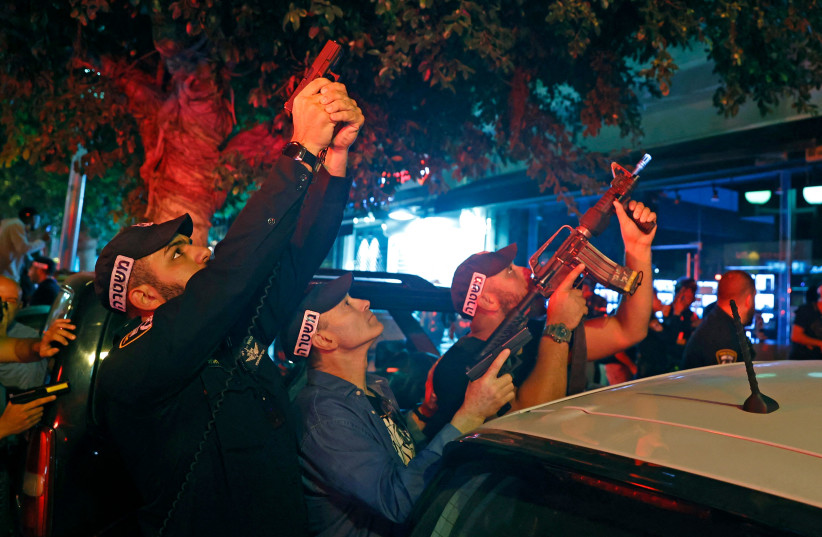Many people who watched the live TV news broadcasts from Dizengoff Street in Tel Aviv on Thursday night came away with an uneasy feeling.
First was the suspense and drama playing out live on television, reminiscent of shows like “24” or Miami Heat. Here was a live chase for a terrorist on the streets of the State of Israel’s main commercial and entertainment hub.
There were the initial images from the scene of the attack, at the Ilka Bar where three people were murdered and half a dozen more were wounded and then the live feed from Dizengoff 176 where dozens of policemen and IDF soldiers stood with their guns and assault rifles pointed upwards due to a suspicion that the gunman - later found near a mosque in Jaffa - was holed up inside.
What they were thinking exactly, was unclear. Had the terrorist been inside the building and opened a window and started spraying the street below he would have hit many of those same security officers. Should the street have not been cleared and then only a select group sent to the building?
And this is only one of the many questions that came out of that evening. In general, what was obvious from the scene was that chaos reigned in Tel Aviv on Thursday night and no one was able to control what was happening.

The reason was that the terrorist was still on the run and was not neutralized right after the attack as mostly happens. As a result, with a terrorist on the run, the city went wild - and with it the country.
Approximately 1,000 policemen and soldiers - including elite units like Sayeret Matkal and Shaldag - descended on the city and began going door-to-door searching for the terrorist. What also happened was that the media - there in larger numbers than usual since it was after all Tel Aviv - decided to follow the security forces on their house-to-house hunt.
Reporters were running - mostly out of breath - after the soldiers and policemen as they went into apartment buildings, backyards and narrow alleyways in search of the shooter. That they were broadcasting police and army tactics on live TV meant nothing. That they were showing the soldier’s and policemen’s faces - some banned from being publicized- also meant very little.
This was about ratings and drama and there was nothing like it before on Israeli TV.
This does not mean that just the media is to blame. Reporters cannot necessarily be criticized for being caught up in the moment and doing their job even if that means chasing policemen and soldiers as they try to do their job.
On the other hand, it can be expected of news directors and editors to understand that some situations are not meant to be covered in that way. A gunman on the loose, still armed and dangerous is a job for the security forces.
For this to happen there needs to be someone who takes responsibility. During the evening pursuit on Thursday night, Communications Minister Yoaz Hendel (New Hope) tried to appeal to the media to follow the event from the main command post set up near the Ilka Bar, where the attack took place. No one really listened.
What also needs to happen is for someone in the government to set rules of engagement with the media and not simply expect a situation to evolve a certain way.
The Prime Minister’s Office has a National Information Directorate and the IDF has one of the biggest spokesperson’s offices in the country. The police PR apparatus has also grown tremendously over the years. Where were all these people? Why wasn’t there a clear flow of information? Why were Tel Aviv residents being asked to lock their doors and stay home but given very little additional information?
Both sides need to learn lessons from what happened on Thursday night. The chaos that the entire country and world watched is not a long-term strategy. Israel needs to get its act together.
